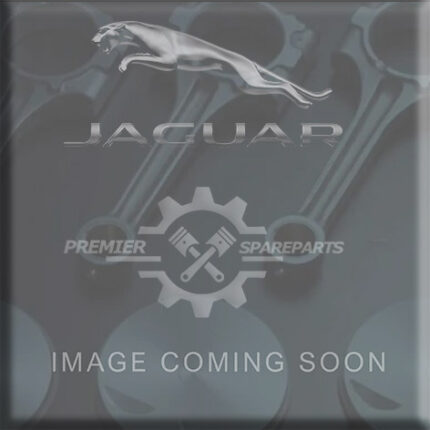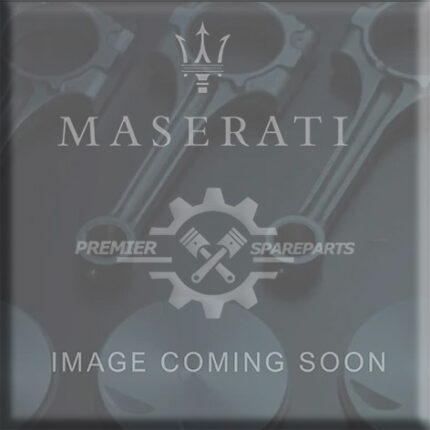Transmission Oil Cooler
The Transmission Oil Cooler is an essential component in the transmission system of the 2010 Jaguar XF. It helps maintain optimal transmission fluid temperatures, ensuring smooth operation and extending the life of the transmission.
Tube from Amplifier to Brake Servo
The Tube from Amplifier to Brake Servo is a crucial component for the Maserati 3200, ensuring optimal performance of the braking system. This high-quality tube connects the amplifier to the brake servo, providing essential pressure for effective braking.
Specifications
- Compatibility: Maserati 3200 GT, Assetto Corsa
- Part Number: 387410316
- Material: High-grade automotive rubber or reinforced plastic
- Installation Location: Integrated within the braking system assembly
- Direct fit for Maserati 3200
- High-quality construction for durability
- Ensures proper brake pressure for effective braking
- Easy installation with OEM specifications
- Vehicle Compatibility: Maserati 3200
- Material: High-grade rubber or reinforced plastic
Tube from Manifold to Brake Servo
Specifications
- Compatibility: Maserati 3200 GT, Assetto Corsa
- Part Number: 387401315
- Material: High-grade automotive materials
- Installation Location: Engine compartment, connecting brake servo to air intake system
Investing in a reliable brake servo air tube is critical for ensuring the safety and performance of your Maserati. Regular maintenance checks will help keep your braking system functioning optimally, providing peace of mind on the road.
Tube from No-Return Valve to Filter Box
This is the genuine Maserati replacement tube that connects the no-return valve to the filter box, part number 387400313. It ensures proper air or fluid flow within the system and maintains factory-level performance and reliability. Always use original parts for optimal compatibility and performance.
Specifications
- Compatibility: Maserati 3200 GT, Assetto Corsa
- Part Number: 387400313
- Material: High-grade rubber
- Installation Location: Engine bay, connecting brake servo to air intake system
Upper Hose
The Upper Hose (C2Z3452) is an essential component of the cooling system in Jaguar vehicles. It connects the engine to the radiator, facilitating the flow of coolant to help regulate engine temperature.
Vacuum Pipe
- Type: A dedicated hose or rigid pipe designed to carry vacuum pressure (a pressure lower than atmospheric pressure) generated by the engine’s intake manifold to various vacuum-actuated components or sensors within the vehicle’s systems. Given it’s a specific part number, it’s a pre-formed, application-specific pipe with precise routing and connectors.
- Function: The primary function of a vacuum pipe is to transmit vacuum signals or pneumatic pressure for the operation of several critical vehicle systems, including but not limited to:
- Brake Booster: Provides vacuum assistance to the power brake booster, significantly reducing the effort required to apply the brakes.
- Emissions Control Systems: Connects to components like the PCV (Positive Crankcase Ventilation) valve, EGR (Exhaust Gas Recirculation) valve, or EVAP (Evaporative Emission Control) system for proper operation and emission reduction.
- Engine Management: Supplies vacuum to various sensors or actuators that control engine idle speed, fuel pressure regulation, variable intake manifold runners, and other engine performance parameters.
- HVAC (Heating, Ventilation, and Air Conditioning): In some systems, vacuum lines control the blend doors and vent actuators for cabin climate control.
- Components: Typically consists of a pre-formed hose made of durable rubber, synthetic polymers, or a rigid plastic tube, often with integrated connectors, check valves, or protective sheathing. The specific configuration of part number 293279 would be unique to its intended location and function within these Maserati models.
- Location: Can be found throughout the engine bay, connecting the intake manifold to the various vacuum-actuated components mentioned above. Its exact routing is specific to its purpose.
- Material: Made from high-quality, heat-resistant, and chemically stable materials such as reinforced rubber (EPDM, silicone), nylon, or polypropylene, engineered to withstand engine bay temperatures, vibrations, and constant vacuum pressure without collapsing or leaking.
- Design: Precisely molded or shaped to fit specific routing paths within the crowded engine bay, ensuring secure connections, preventing kinking, and resisting abrasion.
Vehicle Battery
The Vehicle Battery (C2D61169) is a critical component in Jaguar vehicles that provides the necessary electrical power to start the engine and operate various electrical systems and accessories.
Vibration Damper
The Bracket (AJ811281) is a vital support component for Jaguar vehicles, designed to secure and stabilize critical parts. Made from durable materials, it ensures proper alignment and is easy to install.
Water Pump
The Serpentine Belt (C2C37063) is an essential component in the engine system of Jaguar vehicles. It drives multiple accessories from the engine’s crankshaft, ensuring they operate efficiently and effectively.
Water Pump Assembly
The Water Pump Assembly (AJ88912) is a crucial component in the cooling system of Jaguar vehicles. It is responsible for circulating coolant throughout the engine and radiator, helping to maintain optimal operating temperatures.
Wheel Bearing
- Type: A precision-engineered component that allows the vehicle’s wheel to rotate smoothly with minimal friction while supporting the entire weight of the vehicle and enduring significant forces (radial, axial, cornering). For these Maserati models, this part number typically refers to a complete wheel bearing assembly, which often includes the bearing unit itself and sometimes an integrated hub or mounting flange. It is typically a sealed unit, designed for long-term, maintenance-free operation.
- Function: The primary functions of the wheel bearing assembly are critical for vehicle dynamics, safety, and ride quality:
- Smooth Rotation: Enables the wheel to rotate freely and silently around the axle.
- Load Support: Bears the entire static weight of the vehicle and dynamic loads generated during driving (braking, acceleration, cornering forces).
- Steering & Handling: Maintains the precise alignment of the wheel, which is crucial for accurate steering response and stable handling.
- Reduced Friction: Minimizes friction during rotation, improving fuel efficiency and reducing heat generation.
- ABS/Traction Control Integration: Often incorporates the reluctor ring or magnetic encoder for the ABS (Anti-lock Braking System) and Traction Control system, which transmits wheel speed data to the vehicle’s control modules.
- Components: A typical sealed wheel bearing assembly for these applications includes:
- The bearing itself (e.g., a double-row ball bearing or tapered roller bearing)
- Integrated races and seals
- Often, an outer flange or hub that bolts directly to the suspension components and where the wheel is mounted.
- It does NOT typically include the wheel hub nut, brake rotor, or wheel studs unless specified as a complete wheel hub and bearing kit.
- Location: Integrated into the wheel hub assembly at each corner of the vehicle (front and/or rear axles, depending on the specific application for this part number, which is generally universal for a given axle type on these platforms).
- Material: Constructed from high-strength, hardened steel alloys for the races, rollers/balls, and inner/outer rings, designed to withstand extreme loads and high rotational speeds. Seals are made from durable rubber or composite materials.
- Design: Precisely manufactured to extremely tight tolerances to ensure minimal run-out, optimal concentricity, and long service life, crucial for the performance and refinement expected of a Maserati.
Wheel Bearing
$731.00- Type: A precision-engineered component that allows the vehicle’s wheel to rotate smoothly with minimal friction while supporting the entire weight of the vehicle and enduring significant forces (radial, axial, cornering). For these Maserati models, this part number typically refers to a complete wheel bearing assembly, which often includes the bearing unit itself and sometimes an integrated hub or mounting flange. It is typically a sealed unit, designed for long-term, maintenance-free operation.
- Function: The primary functions of the wheel bearing assembly are critical for vehicle dynamics, safety, and ride quality:
- Smooth Rotation: Enables the wheel to rotate freely and silently around the axle.
- Load Support: Bears the entire static weight of the vehicle and dynamic loads generated during driving (braking, acceleration, cornering forces).
- Steering & Handling: Maintains the precise alignment of the wheel, which is crucial for accurate steering response and stable handling.
- Reduced Friction: Minimizes friction during rotation, improving fuel efficiency and reducing heat generation.
- ABS/Traction Control Integration: Often incorporates the reluctor ring or magnetic encoder for the ABS (Anti-lock Braking System) and Traction Control system, which transmits wheel speed data to the vehicle’s control modules.
- Components: A typical sealed wheel bearing assembly for these applications includes:
- The bearing itself (e.g., a double-row ball bearing or tapered roller bearing)
- Integrated races and seals
- Often, an outer flange or hub that bolts directly to the suspension components and where the wheel is mounted.
- It does NOT typically include the wheel hub nut, brake rotor, or wheel studs unless specified as a complete wheel hub and bearing kit.
- Location: Integrated into the wheel hub assembly at each corner of the vehicle (front and/or rear axles, depending on the specific application for this part number, which is generally universal for a given axle type on these platforms).
- Material: Constructed from high-strength, hardened steel alloys for the races, rollers/balls, and inner/outer rings, designed to withstand extreme loads and high rotational speeds. Seals are made from durable rubber or composite materials.
- Design: Precisely manufactured to extremely tight tolerances to ensure minimal run-out, optimal concentricity, and long service life, crucial for the performance and refinement expected of a Maserati.
Wind Screen Wiper Set Assembly
- Components: Typically includes the electric wiper motor, the wiper linkage/transmission mechanism, and associated mounting hardware. May or may not include wiper arms and blades depending on “set” definition.
- Function: Electrically driven system designed to sweep wiper blades across the windscreen, clearing rain, snow, and debris to ensure clear driver visibility.
- Motor Type: Durable DC electric motor, often with variable speed settings and an intermittent function.
- Linkage Mechanism: Precision-engineered mechanical arms and pivots (transmission) that convert the motor’s rotary motion into the reciprocal sweeping motion of the wiper arms.
- Design: Tailored for the specific curvature and dimensions of the Maserati 4200 windscreen, ensuring full coverage and efficient clearing.
- Durability: Constructed from robust materials (e.g., steel, aluminum, high-grade plastics) to withstand continuous operation, temperature fluctuations, and environmental exposure.
- Connectivity: Integrated electrical connector for power supply and control signals from the vehicle’s electrical system and wiper stalk.
- LHD/RHD Specific: Left-Hand Drive (LHD) and Right-Hand Drive (RHD) versions exist due to the differing pivot points and arm configurations.
Windscreen Wiper Blade Set Assembly
- Type: This part number refers to a complete set of windscreen wiper blades, typically including both the driver’s side and passenger’s side wiper blades, designed for direct replacement on the original wiper arms. These are specialized blades engineered to fit the specific curvature and dimensions of the Maserati GranCabrio and GranTurismo windshields.
- Function: The primary function of the windscreen wiper set assembly is critical for driving safety and visibility in adverse weather conditions:
- Clear Visibility: Efficiently removes rain, snow, sleet, dirt, and debris from the windshield surface, ensuring a clear and unobstructed view for the driver.
- Optimal Contact: Designed to maintain consistent pressure and optimal contact across the entire windshield, providing streak-free wiping.
- Reduced Noise: Engineered for quiet operation, minimizing squeaking or chattering during use.
- Components: The set typically includes two individual wiper blades (one for the driver’s side, one for the passenger’s side), complete with their integrated aerodynamic frames and rubber wiping elements. They feature the specific attachment mechanism required for the GranCabrio and GranTurismo wiper arms. It does not include the wiper arms themselves or the wiper motor.
- Location: Mounted on the exterior of the vehicle, attached to the wiper arms that pivot across the front windshield.
- Material: Consists of a durable steel or composite frame, often with an aerodynamic spoiler, and a high-quality, long-lasting rubber or silicone wiping element. The rubber compound is specifically formulated to withstand UV exposure, temperature extremes, and various contaminants.
- Design: Precisely contoured and sized to match the unique curvature and dimensions of the Maserati GranCabrio and GranTurismo windshields, ensuring maximum contact area and efficient wiping performance at all speeds.
Wiper Brush
-
- Type: Often conventional or beam-style (flat blade) wiper blade, designed for high-performance vehicles.
- Material: High-grade natural or synthetic rubber (e.g., EPDM, silicone) with a graphite or Teflon coating for smooth, silent operation.
- Length: Specific lengths for driver’s side and passenger’s side (e.g., approximately 22-24 inches for driver, 18-20 inches for passenger, always confirm exact lengths for your 4200).
- Attachment: Features a specific connector type (e.g., J-hook, side pin, or specific Maserati proprietary fitting) to securely mount to the wiper arm.
- Performance: Engineered for streak-free wiping, uniform pressure distribution across the glass, and quiet operation at various speeds.
- Durability: Resistant to UV degradation, extreme temperatures, and environmental contaminants for extended service life.
- Aerodynamics: May incorporate an aerodynamic design or spoiler to maintain blade contact at higher speeds.
- Package: Typically sold individually, or sometimes as a pair.
Wire Harness
The Serpentine Belt (C2C37063) is an essential component in the engine system of Jaguar vehicles. It drives multiple accessories from the engine’s crankshaft, ensuring they operate efficiently and effectively.
Wire Harness
The Wire Harness (C2Z4628) is an essential component in the electrical system of Jaguar vehicles. It organizes and connects various electrical components, ensuring efficient communication and operation.
Yaw Rate Sensor
The Jaguar ABS Sensor (C2P15770) is essential for the anti-lock braking system, monitoring wheel speed to prevent lock-up during braking. Designed for select Jaguar models, it ensures reliable brake performance and safety. Easy to install, this durable sensor is key to maintaining effective braking control.
Yaw Sensor
- Type: An electronic sensor that measures the vehicle’s angular velocity (rate of rotation) around its vertical axis (yaw). It’s a key component of the Electronic Stability Program (ESP) or Maserati Stability Program (MSP).
- Function: The yaw sensor constantly provides crucial data to the vehicle’s ESP/MSP control unit. By measuring how quickly the car is rotating or spinning on its own axis, the sensor helps the control unit determine if the vehicle is diverging from the driver’s intended path (as indicated by steering wheel angle and wheel speed). If the yaw rate is inconsistent with steering input and vehicle speed, the ESP/MSP system can then selectively apply individual brakes or reduce engine power to help bring the car back under control, preventing skids or loss of traction.
- Components: A self-contained electronic unit typically containing a micro-electromechanical system (MEMS) gyroscope, an accelerometer (often integrated to measure lateral acceleration), and associated signal processing circuitry, all enclosed in a durable housing with an electrical connector.
- Location: Often located in the vehicle’s cabin, typically under a seat, in the center console, or mounted to the floor pan, usually near the vehicle’s center of gravity. This placement ensures it accurately measures the entire vehicle’s movement without being unduly influenced by suspension articulation or external elements.
- Material: Robust plastic or metal casing housing sensitive electronic components.
- Design: Engineered for high precision and rapid response, crucial for dynamic stability control. It must be securely mounted to avoid erroneous readings from vibration.
- Compatibility: Essential for the proper functioning of the Maserati Stability Program (MSP/ESP) in the 4200.


